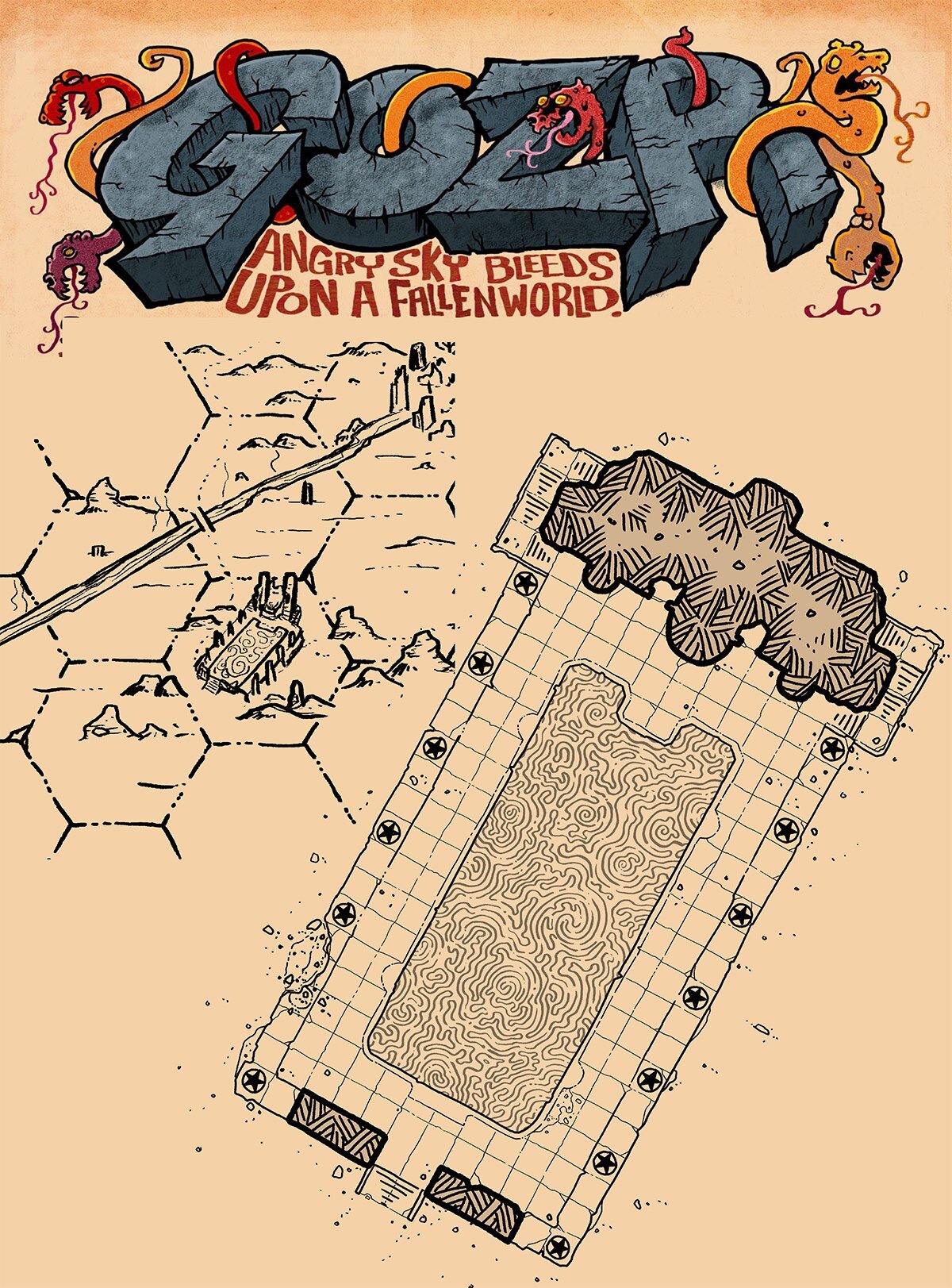

GOZR is the future
The pretty ones are dead but the ugly ones remain. Lowly gooz, the riffraff of polite societies, have inherited the earth. You are gooz. You are curious and bold and ugly in a weird, hostile world.
GOZR is a sci-fantasy tabletop RPG for you and all your weird friends to enjoy! Designed to be a GM’s toolkit, there’s more than enough material in this book to let you have infinite adventures in the weird world of GOZR.
Get the print book and goodies here!
DOWNLOADS
Compatibility License for Third Party Publishers
Compatibility Logo (black and white)
GOZR STUFF ON THE WEB
GOZR Cheat Sheet by Domain of Many Things
Mythic Mountains RPG GOZR Actual Play
Science Fantasy Awesome’s GOZR Solo Play
The Questing Beast’s GOZR Review
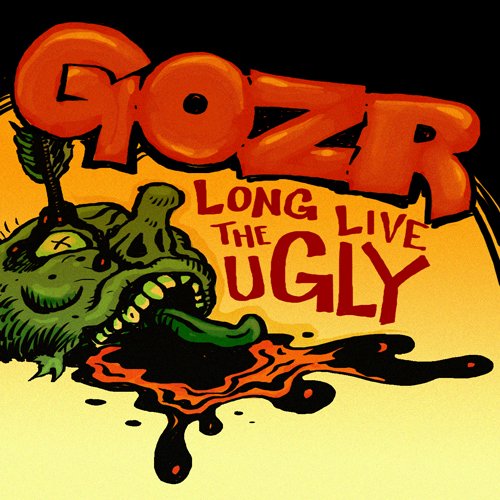
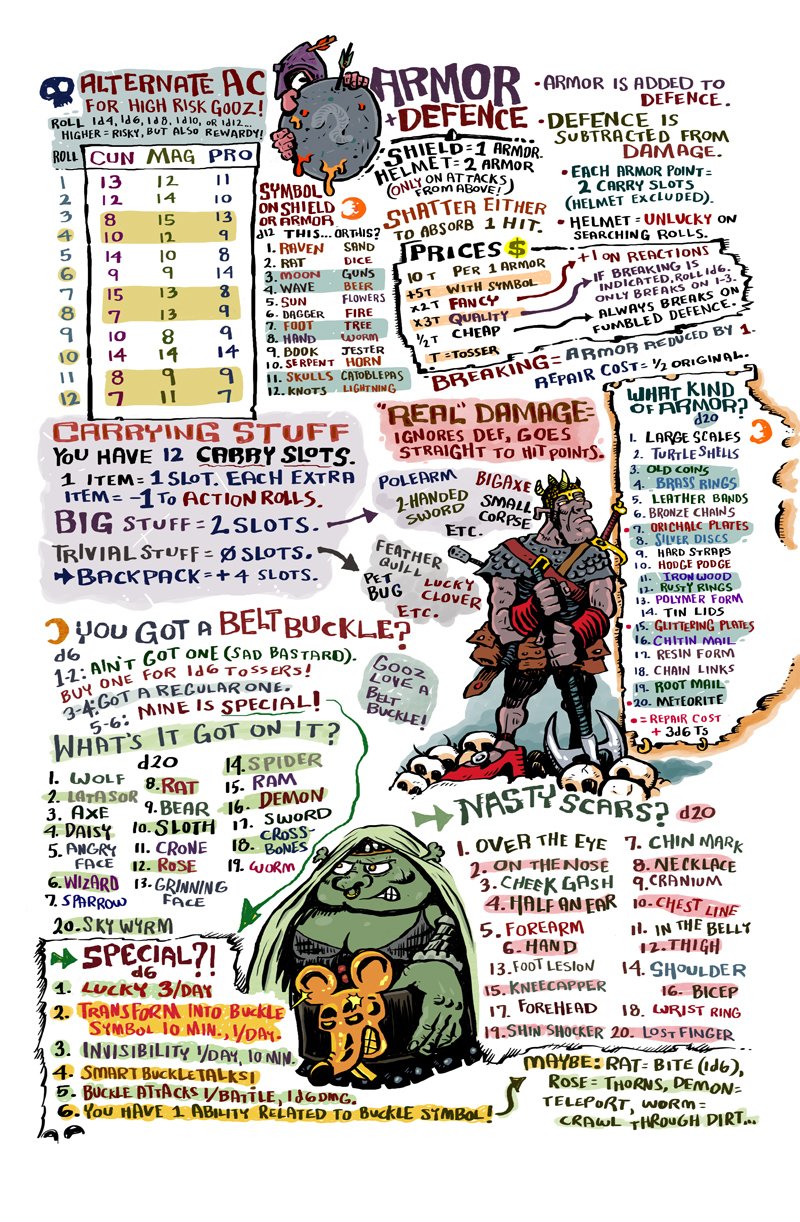
Click for a PDF of Tower Trouble, a one page adventure for GOZR, the ugliest game in the world!
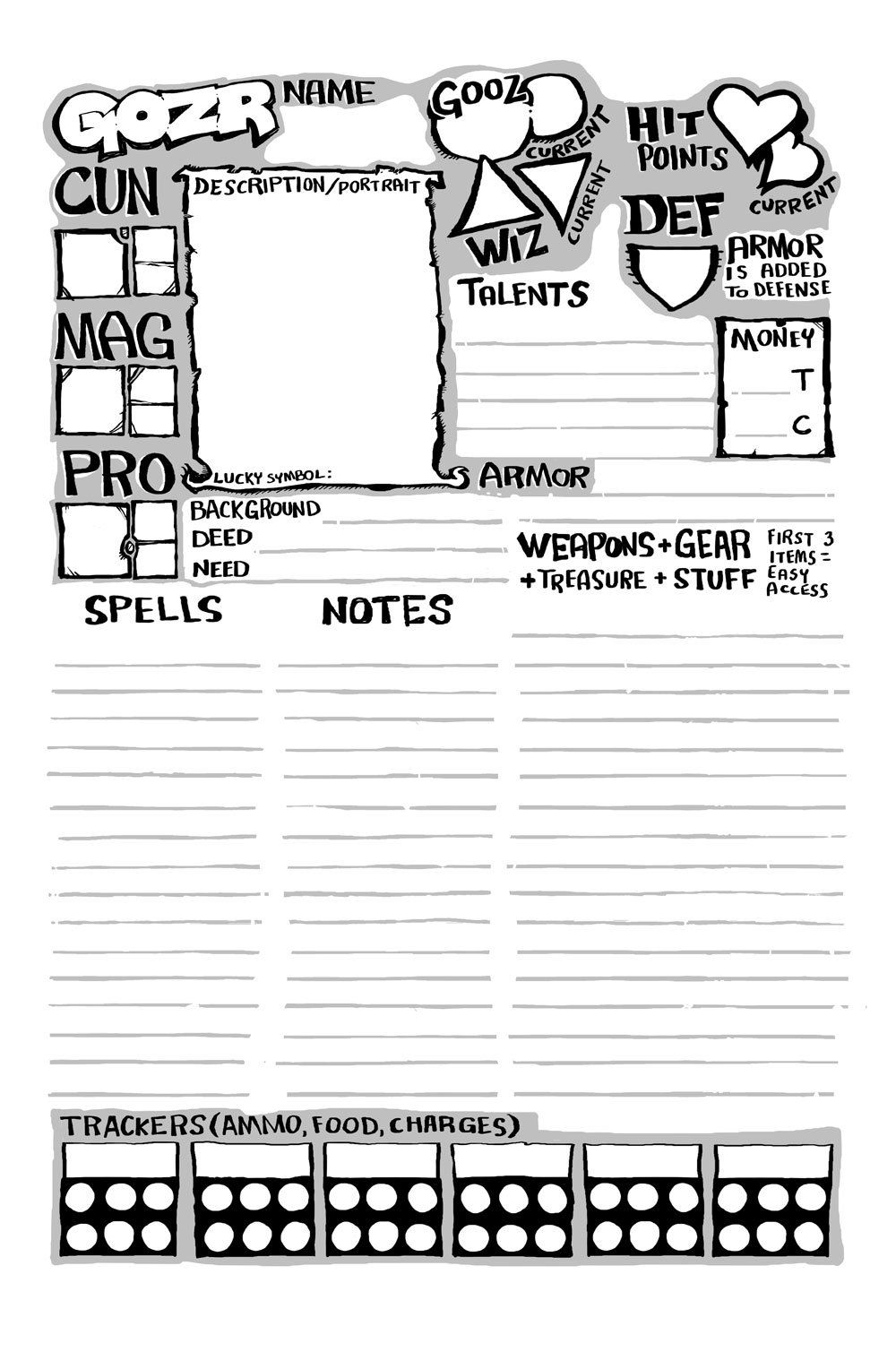
GOZR character sheet version 3. More space for writing things like chicken beaks and whiskey.
Dyson Logos is officially the first person to run GOZR! Here's a map he made that might seem a bit familiar to the schooled... Uhluhtc!
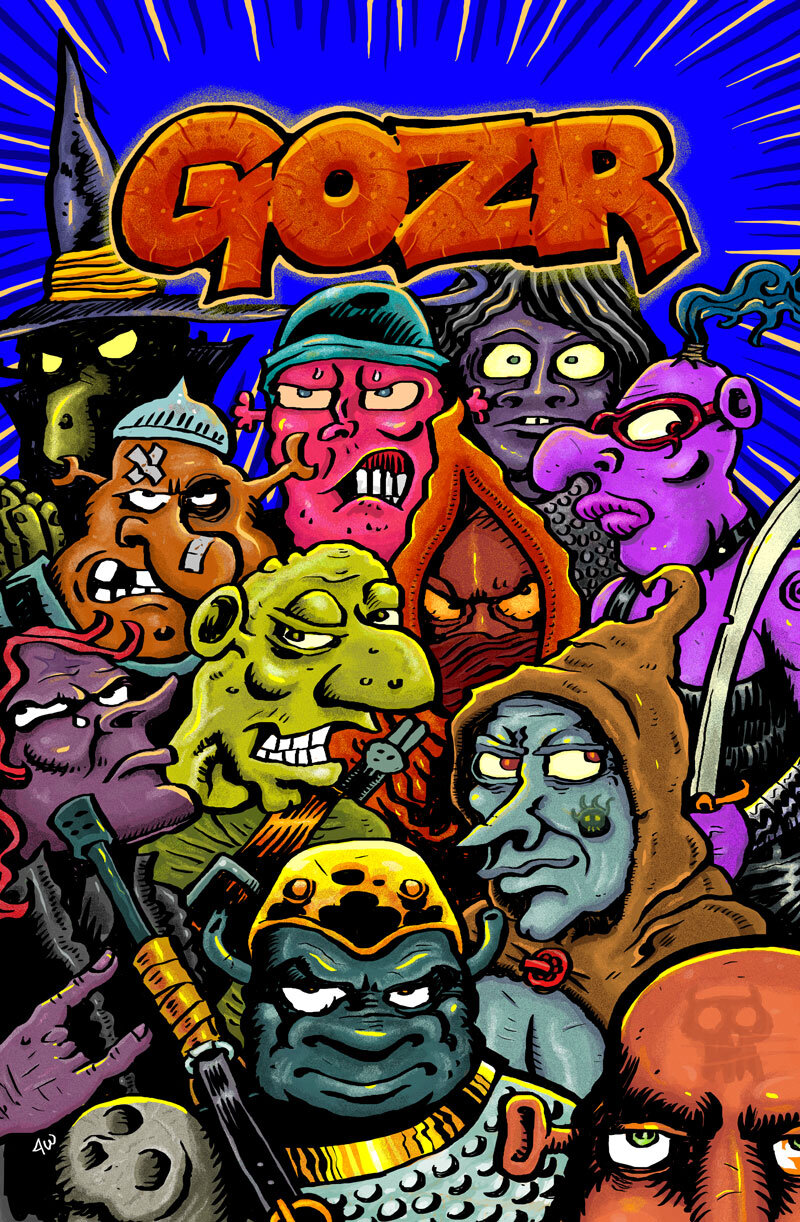
The final cover art! I hope this makes you want to play the game.
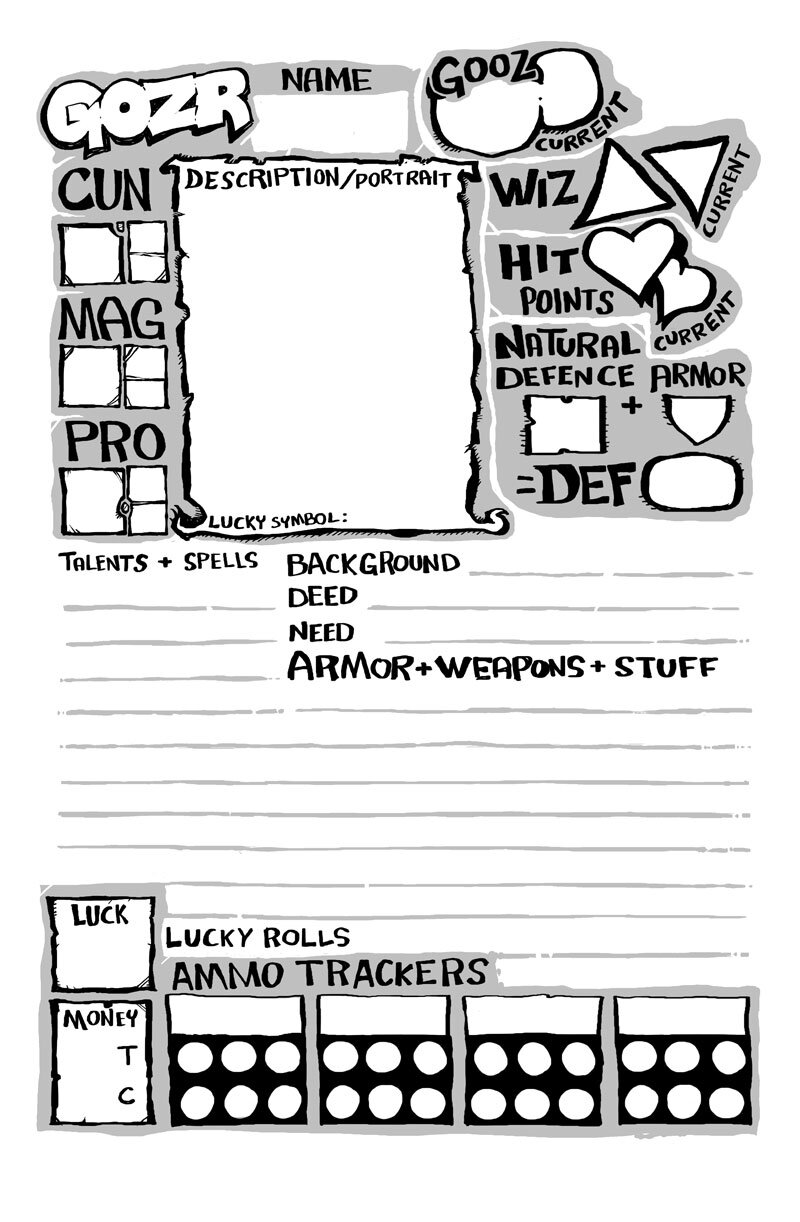
GOZR character sheet, version 2.
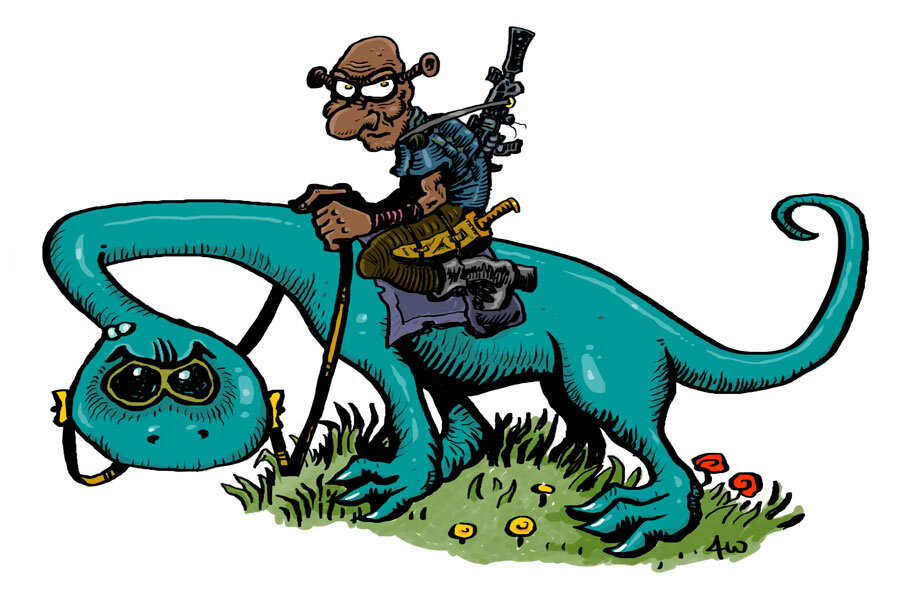
Zards are semi-domesticated lizard mounts with attitude.

Gooz bravos coming home from a scavenger mission, trying to make it to Goozer City before dark!
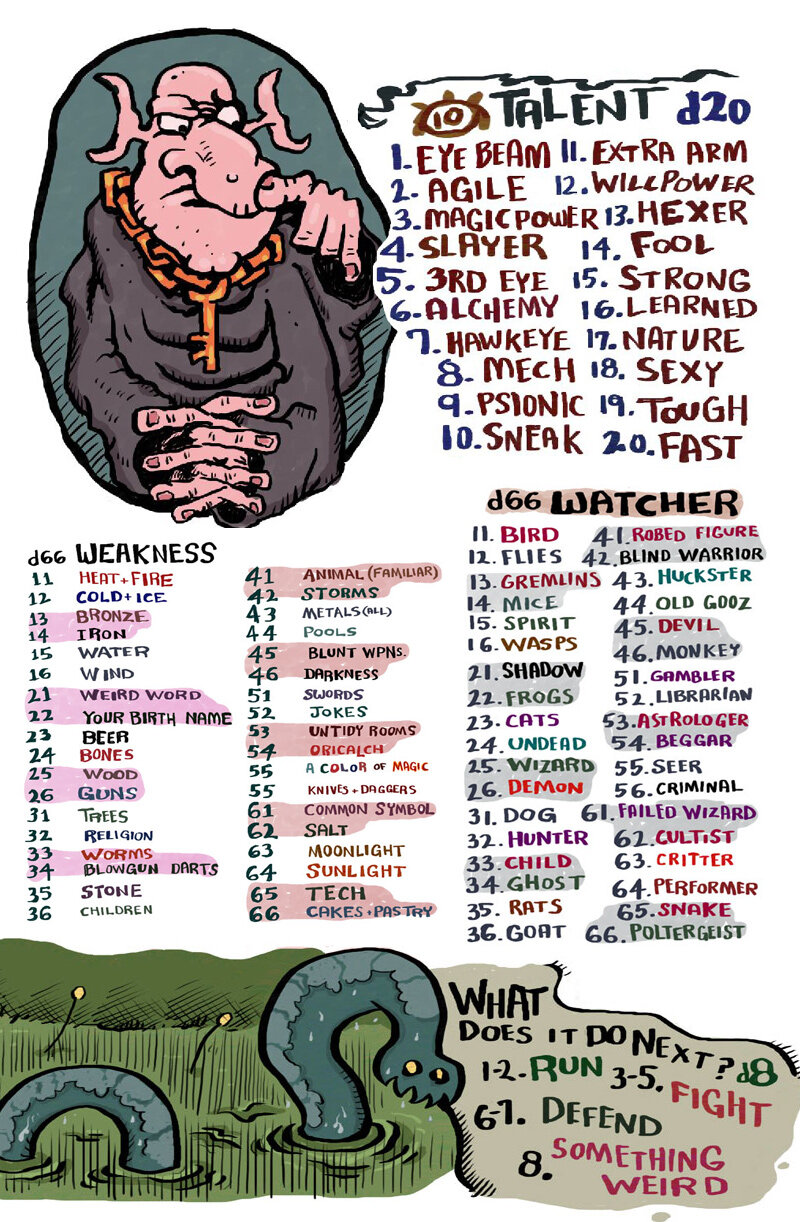
GOZR is a table-heavy book. The rules are simple and lite and the game invites you to randomize the fuck out of the content.

The streets of GOZR city are dangerous.
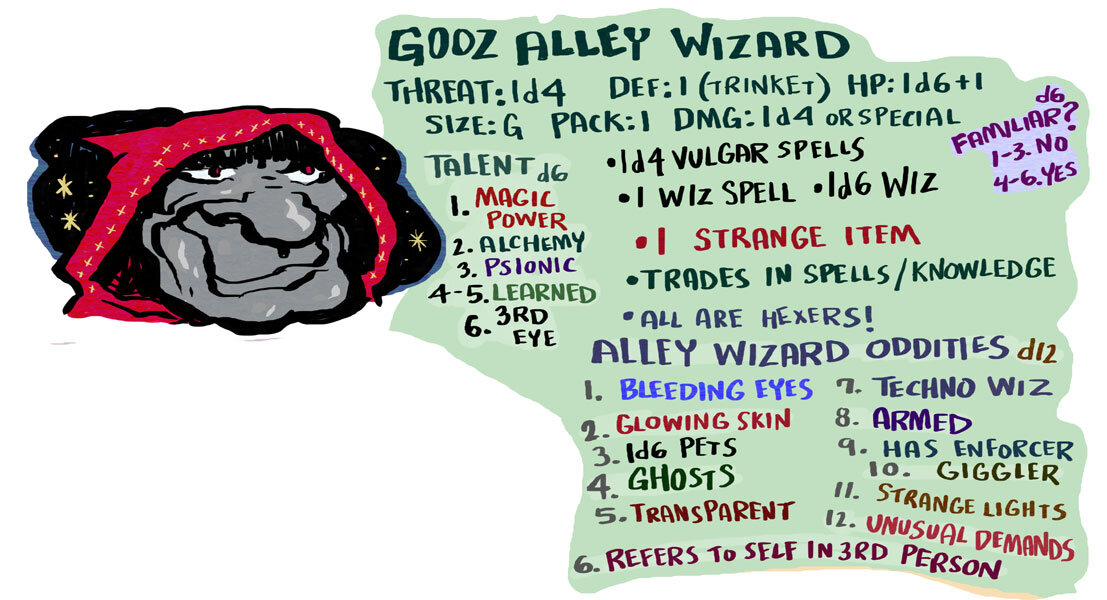
You need a spell or charm? You need a curse lifted? You can't get that weird tech to work? An alley wizard might help for a fee.
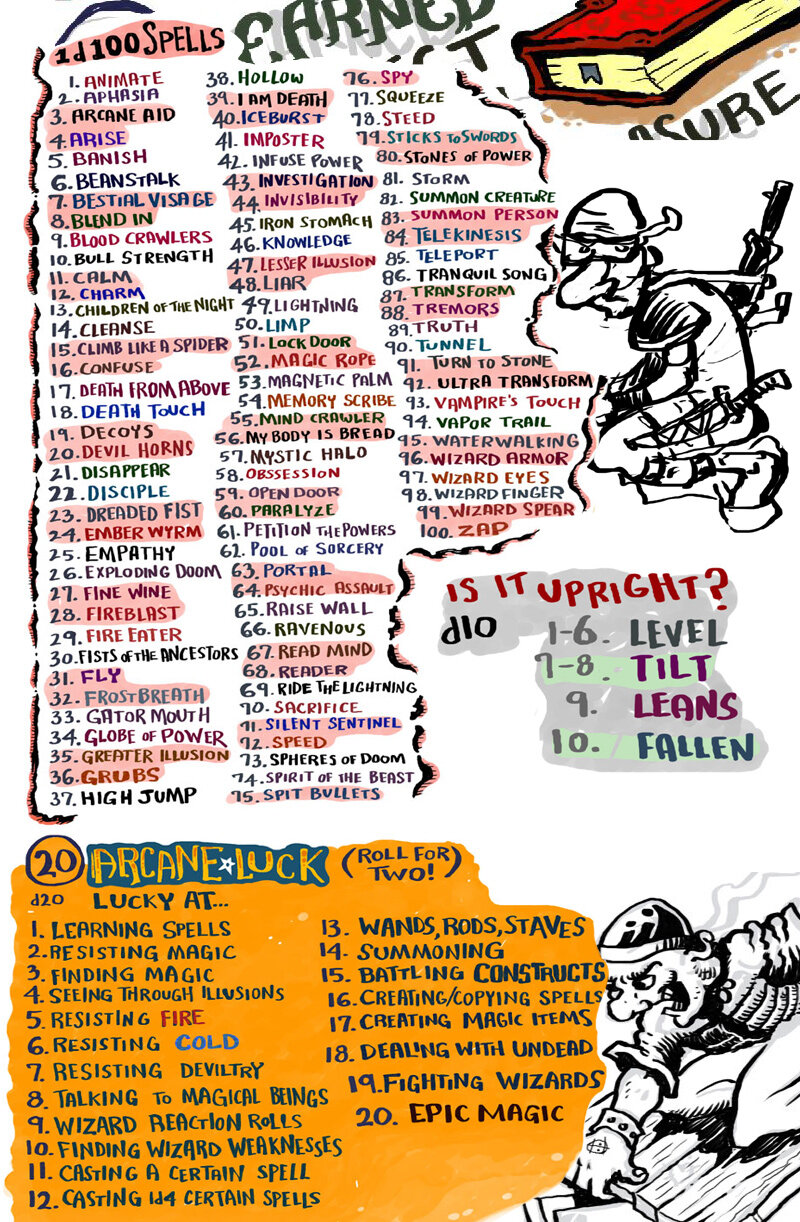
Random tables! Spells!
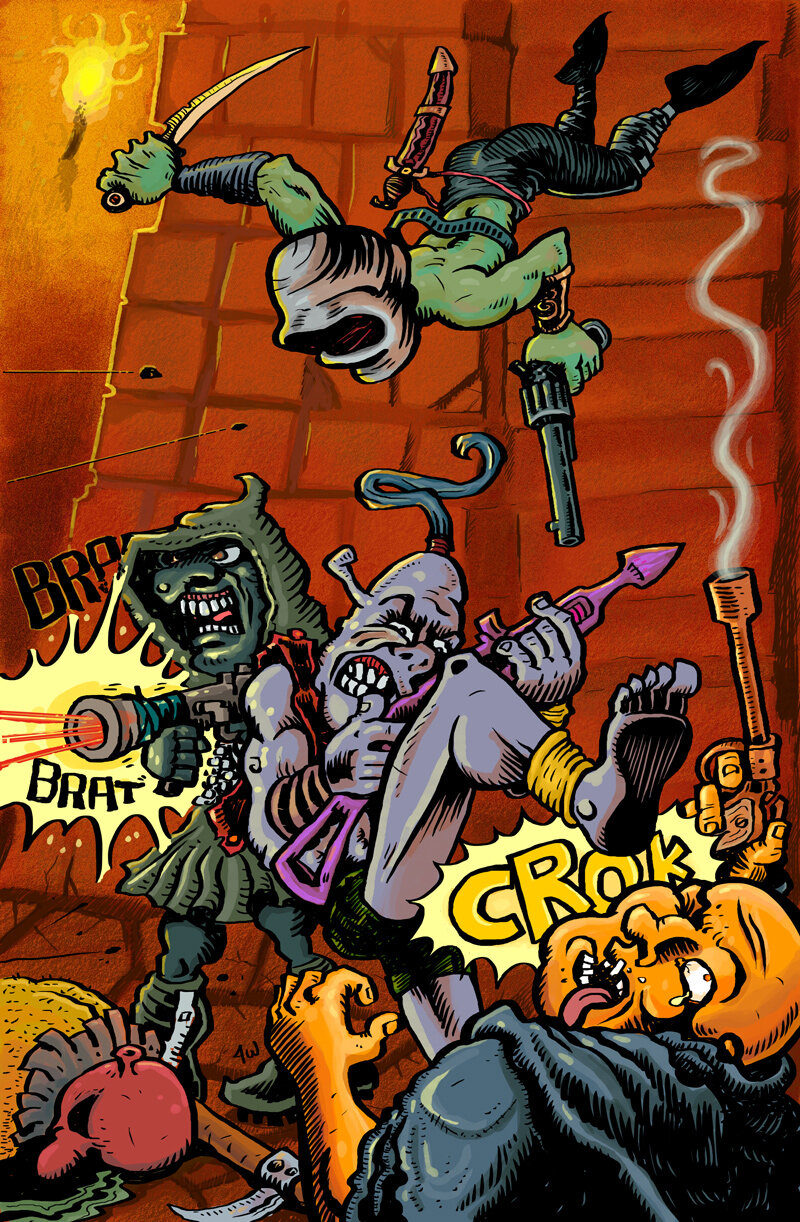
Wearing my influences on my sleeve! If this doesn't make you think of the Den sequence in Heavy Metal then I have failed.
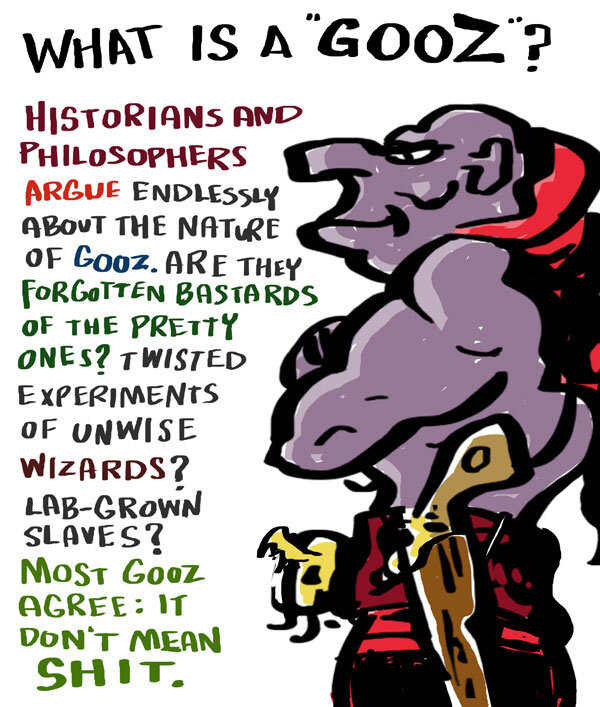
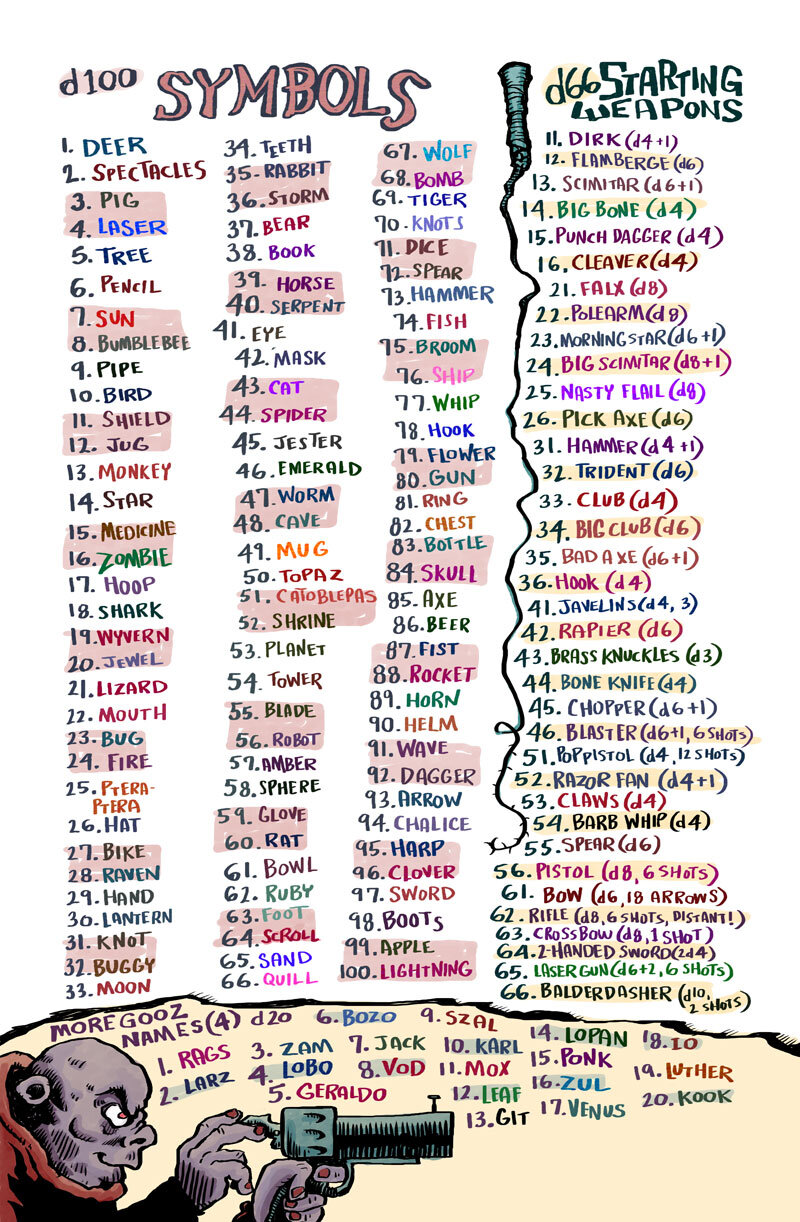
An extra page featuring more lucky symbols, an expanded list of starting weapons, and another gooz names table. Part of the design of GOZR is to scatter these tables all over the damn place so you can pick and choose as you see fit.
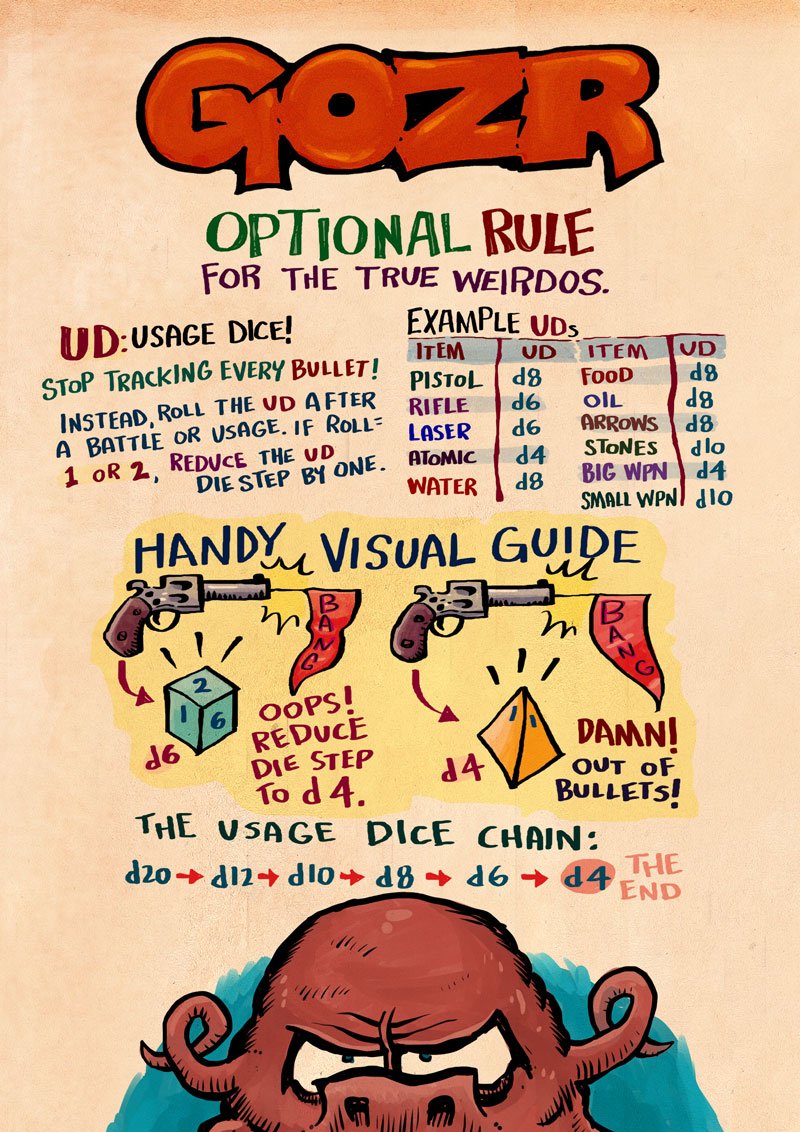
(Legacy) Game notes.
GOZR is inspired by Heavy Metal, especially the work of the late Richard Corben, as well as many other sci-fantasy books and movies. The format is going to be standard American comic book size (6.625 by 10.187 inches) and it will be 48 pages. There will be a PDF version as well as the full color print version.
There will be some additional downloads available such as a black and white character sheet, printable map, and an artless, plain, boring text file that is a 100% faithful transcript of the game book.
EDIT: The printed comic proof copy has been ordered from Lulu! Should have it in a week or two (early April). If all looks well, the book will go live by mid-April. Bazooka!
EDIT TOO: Massive change. The book is now going on Kickstarter, managed by Peter Regan of Squarehex (same folks who print Black Pudding). Should look super!
Game System
This is an original system inspired by various games such as original D&D, Talislanta, The Black Hack, Into the Odd, Trollbabe, and Troika! to name a few.
Most of the action mechanics are player-facing, meaning the players make all the rolls (nod to The Black Hack). PCs (player characters) have three primary stats: Cunning (stealth, wit, charisma), Magic (magic, knowledge), and Prowess (fighting, action). Each of these is called an Action Class (AC). These are the target numbers you have to roll against on a 1d20 in order to succeed in an action. I like the idea of partial success (Talislanta), so there is a “graze” result when you miss by 1.
I chose the three Action Classes because it feels right for the style of play and aesthetic. I thought about sword and sorcery and how characters in those kinds of stories interact with the world. I decided that these three categories of action cover all the meaningful bases. And there’s a ton of RPG precedent for this as it essentially aligns with Thief, Wizard, and Fighter - the meat and potatoes of adventure gaming. This choice was also inspired by Trollbabe’s use of three stats: fighting, magic, and social.
I wanted to avoid having a ton of modifiers. You can be Lucky on a roll, which gives you +2. Luck stacks… but each additional Luck is +1. Again, the target is your AC (Cunning, Magic, or Prowess).
All PCs are gooz (the ugly ones). And each PC has Gooz… the luck, charm, and chutzpah of the ugly people. Mechanically, Gooz is a pool of points you can spend to “do amazing shit”. Take an extra action, be next to act, pull off an awesome stunt, add a fact to the game-story, etc. That last bit - adding a fact - is a direct nod to my work on The Pool and it’s Monologue of Victory as well as the various games that came around that time and after it. Basically early storygaming shit. I think including those little bells and knobs enhances play.
The Action Classes are of course inspired by Armor Class and evolved from a design I had using the old descending AC method from original D&D. Another direct descendant from that game is Hit Points. HP are used in GOZR pretty much exactly as you’d imagine. But when you run out of HP you don’t automatically die. Instead - inspired by Trollbabe - you get to decide if you die or if you are simply debased. Debasement means you roll on a table and your PC suffers some kind of permanent negative impact such as making an AC target worse, losing hit points, etc.
Armor adds to Defense, which is subtracted from damage with a minimum of 1 point always making it through on a hit.
Instead of extensive lists of equipment, I have multiple random tables of random stuff, weird weapons, strange items, etc. Each has its own little flair. So you may have a sword that deals 1d6 damage while I find a sword that deals 1d6+2 because it has a skull on it or something.
Three Ideas that Really Fuckin’ Matter To Me
Which brings me to three extremely important ideas: scattershot, repeated rules, and organic development.
• Scattershot just means I’m throwing a lot of stuff on the walls to see what sticks and I’m not cleaning it off. You might find a single sentence or image in the book that suggests something about the setting. If you don’t notice it and don’t include it in your game, that’s fine. But if you do include it then all the better. For example, I have a bit about PCs being shit on by birds and monkeys while walking the streets of Goozer City. You can take that or leave it.
• Repeated rules is self-explanatory. I dislike games where I have to sift through hundreds of pages to find one little rule that’s important. So I repeat some of the rules multiple times across the book. For example, “Real” damage means damage that ignores armor. This idea is repeated on at least three different pages. Also, the idea of Action Classes being rolled against to do pretty much everything is repeated a few times. The repetition reinforces the idea.
• Organic development means there are no levels and very little formalized character advancement. PCs will change and grow over time as they find cool shit to play with and the GM introduces changes to their world. The only real codified mechanic for advancement is the “level up”: if you survive an adventure, you can choose two benefits from a list of five (more HP, some Lucky rolls, random special item, etc.).
Playtesting
The game was ran by Dyson Logos and it seemed to work out pretty good. The feedback was super helpful because it revealed a serious flaw in the combat system. After that, Andy Solberg ran it and I was able to play in a fairly long adventure where the system got a real workout. We hammered out a few more system issues and smoothed out some rough edges.
This Is an Adventure Game
GOZR is a sci-fantasy adventure roleplaying game in the traditional Gamemaster (here called a Goozmaster, natch) and Player dynamic. This will not appeal to everyone, and that’s OK. This is my love letter to Den, Bodē, and Wizards. The system is simple so I can remember it all and the play is intended to be cinematic because that’s what I like. If those things appeal to you, then maybe you’ll like the game. I hope so.


